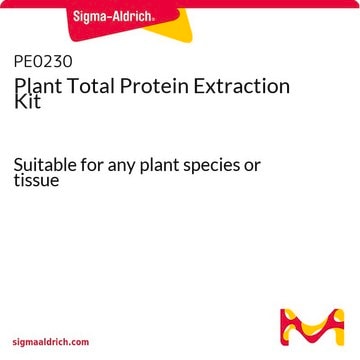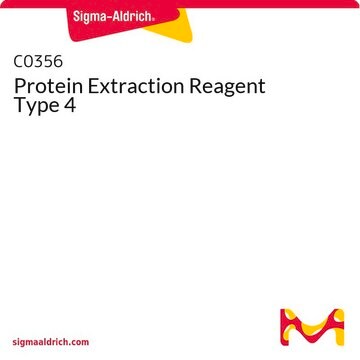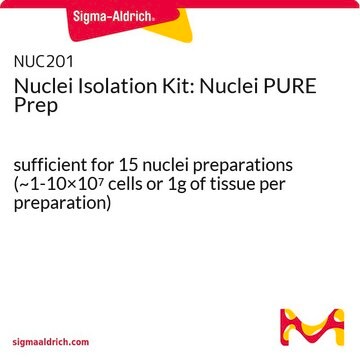PE0240
Plant Fractionated Protein Extraction Kit
Suitable for any plant species or tissue
About This Item
Produits recommandés
Utilisation
sufficient for 20 extractions
Température de stockage
−20°C
Description générale
Following removal of polyphenolics, tannins and other interfering substances, ground plant tissue, fresh or frozen, is resuspended in a specially formulated reagent to extract hydrophilic proteins. After sequential extractions of hydrophilic proteins, addition of the chaotropic reagent provided extracts hydrophobic membrane bound proteins. Plant debris is pelleted by centrifugation and protein extract solutions are collected. The end results are qualitative fractionated protein samples, ready for downstream proteomic analysis.
Composants de kit également disponibles séparément
- Plant Protein Extraction Reagent Type 1 1 bottle
- C0356Protein Extraction Reagent Type 4 1 bottleFDS
- P9599Protease Inhibitor Cocktail, for plant cell and tissue extracts, DMSO solution 3 x 1FDS
- T7567Tributylphosphine solution, 200 mM (in N-methyl-2-pyrrolidinone), liquid 3 x 0.5FDS
- A3221Iodoacetamide, Single use vial of 56 mg 3 vial(s)FDS
Mention d'avertissement
Danger
Mentions de danger
Classification des risques
Acute Tox. 3 Oral - Aquatic Chronic 2 - Carc. 2 - Eye Dam. 1 - Repr. 1B - Resp. Sens. 1 - Skin Corr. 1A - Skin Sens. 1 - STOT SE 3
Organes cibles
Respiratory system
Code de la classe de stockage
6.1C - Combustible acute toxic Cat.3 / toxic compounds or compounds which causing chronic effects
Certificats d'analyse (COA)
Recherchez un Certificats d'analyse (COA) en saisissant le numéro de lot du produit. Les numéros de lot figurent sur l'étiquette du produit après les mots "Lot" ou "Batch".
Déjà en possession de ce produit ?
Retrouvez la documentation relative aux produits que vous avez récemment achetés dans la Bibliothèque de documents.
Les clients ont également consulté
Notre équipe de scientifiques dispose d'une expérience dans tous les secteurs de la recherche, notamment en sciences de la vie, science des matériaux, synthèse chimique, chromatographie, analyse et dans de nombreux autres domaines..
Contacter notre Service technique














